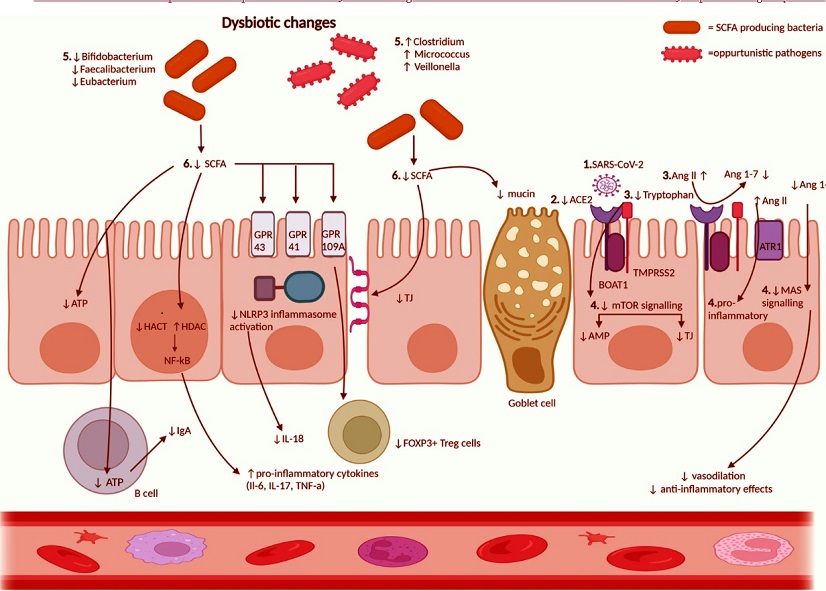Nikhil Prasad Fact checked by:Thailand Medical News Team Jan 26, 2025 2 months, 3 weeks, 3 days, 23 hours, 8 minutes ago
Medical News: Emerging research has been shedding light on the underlying mechanisms of Long COVID, a persistent condition affecting individuals after their initial recovery from COVID-19. A team of researchers from multiple institutions, including Aga Khan University in Pakistan, Fiocruz Salvador in Brazil, and the University of Washington in the United States, conducted an extensive review to understand how chronic inflammation and changes in the gut microbiome are implicated in the prolonged symptoms of Long COVID. This
Medical News report explores the complexities of the gut-brain axis and its significant role in the ongoing health challenges faced by Long COVID patients.
 Gut Dysbiosis and Chronic Inflammation in Long COVID
The Impact of Long COVID
Gut Dysbiosis and Chronic Inflammation in Long COVID
The Impact of Long COVID
Long COVID, also known as Post-Acute Sequelae of COVID-19 (PASC), has emerged as a critical area of concern for health professionals worldwide. It encompasses a wide range of symptoms, including fatigue, brain fog, joint pain, and digestive issues, that persist long after the acute phase of the infection. Recent estimates suggest that a substantial proportion of COVID-19 survivors - up to 30% of those who were severely ill - continue to experience lingering health problems for months or even years.
One of the most intriguing aspects of Long COVID is the variability in symptoms and severity among patients. While some recover fully, others face debilitating health challenges that severely impact their quality of life. Researchers have been delving into various factors that could influence these outcomes, and a growing body of evidence suggests that inflammation and gut health play a crucial role.
Gut-Brain Axis and Long COVID
The gut-brain axis, a complex communication network linking the gastrointestinal tract and the central nervous system, is a key focus in understanding Long COVID. Alterations in the gut microbiota, or gut dysbiosis, have been linked to a variety of neurological and psychological symptoms observed in Long COVID patients.
According to the study led by Najeeha Talat Iqbal and her team, disruptions in the gut microbiome could significantly affect brain function and immune response, thereby contributing to the chronic symptoms associated with Long COVID.
The study highlights that the gut microbiota influences the brain through microbial metabolites, such as short-chain fatty acids (SCFAs). These metabolites play a vital role in maintaining brain health and regulating the immune system. When gut dysbiosis occurs, the production of beneficial SCFAs decreases, potentially leading to inflammation and neurological disturbances. This pathway, often referred to as the microbiota-gut-brain (MGB) axis, is crucial in the context of Long COVID.
Key Findings on Gut Dysbiosis
The researchers identified several specific changes in the gut microbiota associated with Long COVID. Long-term COVID-19 patients showed a significant reduction in beneficial bacteria, including Faecalibacterium prausnitzii, Ruminococcus, and Bifidobacterium. These bacteria are known for their anti-
inflammatory properties and their role in producing SCFAs. Conversely, an increase in opportunistic pathogens, such as Clostridium species, was noted. This imbalance in the gut environment is thought to contribute to systemic inflammation and increased susceptibility to secondary infections.
In addition to microbial changes, the study discusses how chronic inflammation disrupts normal gut functions. Persistent inflammation leads to a "leaky gut," where the intestinal barrier is compromised, allowing harmful substances and pathogens to enter the bloodstream. This situation triggers a cascade of immune responses, further exacerbating inflammation and potentially causing symptoms like fatigue, brain fog, and gastrointestinal discomfort.
The researchers also pointed out the role of the hypothalamic-pituitary-adrenal (HPA) axis, which is closely linked to the gut-brain axis. Dysregulation in the HPA axis due to gut dysbiosis may lead to altered stress responses and increased levels of stress hormones like cortisol. Such hormonal imbalances are believed to play a role in the mood disturbances and cognitive impairments commonly reported by Long COVID patients.
Potential Therapeutic Approaches
Given the link between gut health and Long COVID symptoms, there is a growing interest in therapeutic strategies that target the gut microbiome. The study highlights the potential benefits of probiotics, prebiotics, and dietary interventions aimed at restoring a healthy balance of gut bacteria. Probiotics, in particular, have shown promise in modulating immune responses and reducing inflammation in various studies. However, the researchers emphasized that more clinical trials are needed to establish clear guidelines for the use of probiotics in Long COVID management.
Dietary changes that increase the intake of fiber and nutrients supporting gut health may also be beneficial. Foods rich in prebiotics - compounds that nourish beneficial gut bacteria - could help improve the gut environment and enhance the overall health of Long COVID patients. This approach, combined with the use of probiotics, could offer a holistic way to address some of the symptoms associated with this condition.
Conclusions and Future Directions
The study conducted by Najeeha Talat Iqbal and her colleagues provides valuable insights into the complex interplay between the gut microbiome, inflammation, and the long-term symptoms of COVID-19. By focusing on the gut-brain axis and the mechanisms of gut dysbiosis, the researchers have highlighted a potentially crucial factor in the pathogenesis of Long COVID. Their findings suggest that targeting the gut microbiota could be a promising avenue for therapeutic interventions aimed at alleviating the chronic symptoms faced by many COVID-19 survivors.
However, the researchers caution that further studies are essential to understand the full scope of gut-brain interactions in Long COVID. There is a need for more extensive clinical trials to explore the effectiveness of probiotics, prebiotics, and dietary interventions. Additionally, understanding the role of genetic, environmental, and lifestyle factors in shaping the gut microbiome and its impact on COVID-19 outcomes will be critical in developing personalized treatments for Long COVID.
The study findings were published in the peer-reviewed journal: Molecular Medicine.
https://molmed.biomedcentral.com/articles/10.1186/s10020-024-00986-6
For the latest on Long COVID, keep on logging to Thailand
Medical News.
Read Also:
https://www.thailandmedical.news/news/insights-into-the-gut-s-role-in-long-covid
https://www.thailandmedical.news/news/microbiota-dysbiosis-and-serotonin-dysregulation-linked-to-long-covid-gastrointestinal-symptoms
https://www.thailandmedical.news/articles/long-covid
